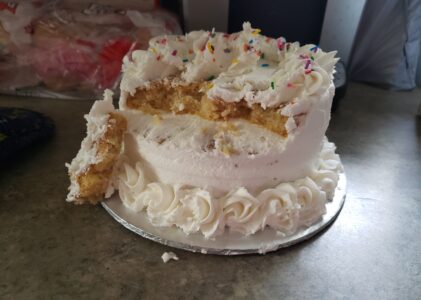In my last blog post, The Lies I Tell Myself I touched briefly on why I believe the lies I tell myself. In this post I will go into a bit more depth. My hopes and prayers are that you will recognize one reason you believe a lie. When you become aware of why you believe lies you can counter them with a new truth and improve the language you use with yourself. Let’s get to it. I will start with the why’s I had in the last blog post.
We do not like something about ourselves (or our situation) and we try to cover it up with a lie. I purposefully wrote “try” because deep down we know the truth and the truth is hard to swallow. A lie preserves my sense of self.
We lie to ourselves because it is comfortable. Telling myself a lie keeps me in my comfort zone. I do not have to break out of the ordinary into unknown territory.
We lie to ourselves because it is convenient. We can keep doing the same thing without having to change anything. Again, this is comfort zone territory.
We lie to ourselves because it makes us feel better. Lying preserves our self-esteem. We want to feel good more than we want to know who our true self is.
We lie to ourselves to avoid responsibility for our actions.
We tell ourselves lies to cover up the mental conflict that occurs when our beliefs do not line up with our actions. This is known as cognitive dissonance.
Allow me to expand with a few more reasons to why we believe the lies we tell ourselves.
Lies confirm my position. Some people have the need to be right. In order to be right, they have to lie to affirm their position. That includes lying to themselves. Under these circumstances, to lie to someone else we have to lie to ourselves first. Have you ever found yourself in an argument and said, “you always do that.” Always is a big word meaning at all times. Most people do not “always” do something. More accurately would be “you often do that.” So, is this a lie or a misuse of words? I know for myself when I used this in an argument it was a lie. I would use it to affirm my position and it made me feel superior.
Lies protect us from other fears. We are not often aware of fear in our lives on a daily basis. We use lies to cover up or avoid our fears of inadequacy, loneliness, failure, change, rejection, uncertainty, being judged by others, being excluded, or intimacy to name a few. You tell yourself a lie to protect yourself and maintain a sense of security.
A lie can rationalize the decisions I made. I can tell myself it is the best decision, under the circumstances. This is the “fine line” lie between the truth and lie. I can often justify the decision in a few different ways. In the end I am trying to protect myself from something. Something like not having all the information I needed to make a sound decision, so I made a hasty decision. I do not want to admit I made a hasty decision, so I tell myself it is the best decision.
We believe the lie because you refuse to accept the reality of your situation, so you change it by changing the narrative. This one hits me close to home. I lied to myself about the abuse I experienced at home because I did not want to admit things were as bad as they were. I was very fearful of the future if my marriage failed. I had no idea how I would survive. Lying to myself did not delay the inevitable. It did not delay the threats to my life or the lives of my children. I had to come to terms with the truth.
There is good news. You CAN confront the lies and start living in the truth. The truth is where freedom lives. The bible says, the truth will set you free. Truth certainly sets you free.
To counter a lie there are a few things necessary to keep at the forefront of your mind. The first thing is to be aware. In daily life there are situations that cause you to lie to yourself. Be aware. You do lie to yourself. Ask yourself,
Where am I?
Who am I with?
Am I lying to make someone feel better or make myself feel better?
How do I feel right now?
These few questions can be answered quickly in any situation or in retrospect. Whenever you stop to answer these four questions you can determine your truth and choose to act differently now and in the future.
Set boundaries. You knew boundaries would rise to the surface eventually. They have to so here we are with a brief note on boundaries. Boundaries protect us. Boundaries are the decisions you make, in advance, to act in a certain way, remove yourself from situations or decline certain people or situations. There are good books on boundaries. My favorites are BOUNDARIES by Henry Cloud and John Townsend and BOUNDARIES: WHERE YOU END AND I BEGIN by Anne Katherine, M.A. Andy Stanley has a great series on Guardrails. I encourage you to listen to the whole series.
Start small. No one can change everything all at once. They say the only way to eat an elephant is one bite at a time. Changing the way, you talk to yourself is the same. Determine one lie you tell yourself. Figure out why you tell yourself the lie. Are you protecting yourself? Are you protecting someone else? Are you acting out of fear? Once you have defined the lie you now have the power to tell yourself the truth. You will need to tell yourself the truth over and over again. Do not get discouraged if you slip. After a period of time, you will notice that you no longer believe the lie. You may not even remember the lie. The amount of time it takes is as unique as you are. Be patient. Remember this is a journey not a sprint.
Learn acceptance. Yes, I am talking to me as much as to you. We are often more accepting of others than we are of ourselves. Accepting the truth can be challenging. Learning to accept the truth can be tough. Learning the truth is a gateway to valuable lessons. I can guarantee you that facing the truth is worth it. When you accept yourself for who you are your world becomes beautiful. I would rather live accepting all of me than I would living a lie. How about you?
Overcome lies by becoming the observer. Observe yourself. Be present in the moments of your life. Introspections does not require a retreat or a quiet place. We can do it moment by moment. Be aware of how you are feeling. Ask yourself why are you feeling this way? Open the places that rarely get the light. Be brave and courageous. You can change your story. You can change your narrative. There is power in making choices. There is power in choosing to do something different, to be someone different.
Finally, stop justifying. Stop making excuses and justifying what you tell yourself. Dig deeper to figure out why you are lying to yourself. Check the vocabulary you use with yourself. In the Ted Talk Carolyn Myss presented on Choices That Can Change Your Life, she says the following.
“Finally, make this choice. Choose to get up every day and bless your day. Choose to get up every single day and bless your day. And you say I have no idea what is going to be in my day, but it is blessed, why? Because I am alive. And do not base your gratitude for your life on what you have or how you feel. But just because you are. Just because you are. Just because you are. And then hold in your heart this prayer. This day of my life will never come again. I will never see the people I am looking at again. I will never see this sunrise again and I will never see that sunset. I will never see the person having breakfast with me again. Just this way. You know, nothing in my life like this will ever come again. That alone, that choice alone should take out of your heart every bitter taste there is. That it should shape the life around you with such grace and such beauty. That will make you only want to see the present with great gratitude.”
Our next blog post will be on THE TRUTH. As much as we tell ourselves lies, we also tell ourselves some truths. There are truths you need to know. Judy and I are looking forward to revealing this post to you. See you next time in Wounded Women Rising.

